Growing Up with Dad
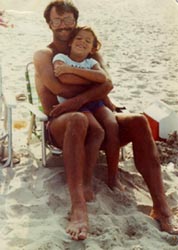
Father's Day Special
~ by Christopher Heagy
Sons and Daughters Talk about
Growing Up with Dad
When I was born, my mother wanted to name me David but my father said he would call me Dave. She decided on Christopher, and it was never Chris. My father followed her rules.
My mother and father had a give-and-take relationship. That's why things worked so well. In many ways, my father and I have developed our own give-and-take relationship. Maybe that's why things work so well for us, too.
My father and I have had some bumps in the road, but we are where we are, standing tall and looking each other in the eye. I always thought we had the relationship that every father and son should have. In writing this story, I just wanted to thank some guy I've known for awhile.
Writing about my relationship with my father made me want to know about other adult children's relationships with their fathers and to see how they got where they are. I started asking questions.
Sharing their stories this Father's Day are Frances Hughes Glendening and Melanie Miller, who give us glimpses inside political families to their relationships with powerful fathers. Ann Dorsey and Warren McClain describe relationships evolving through the difficulties and triumphs of growing up.
Listening to their stories and the respect, wonder and understanding of these children, I've realized that mine is not the only path.
Christopher Heagy, 24, son of Roger Heagy
Give and Take
When I was young, I was afraid of my dad. He was a hulk of a man. At 6' 5" and 250 pounds, Roger Heagy towered over me like a giant.
His booming voice highlighted a hidden temper that crept out every now and then. He never spanked me, but he could roar.
When my sister, Rebecca, was seven and I was four, the washing machine in our basement exploded. Water was everywhere. My sister ran upstairs and returned, leading my dad to the mess. He saw the washing machine and yelled, "Oh, @#$%$!!!" Right on cue, my sister turned to me and said, "See, I told you he'd say that."
When I was 10, I was having a catch with a friend in the back yard. One of his tosses flew over my head and through a giant picture window. I never said a word to my friend. I headed straight to my room and hid in the closet for the next four hours.
When I heard my mom come home, I left the closet to show her the damage. Dad got home when we were sitting on the hill, surveying the destruction. I wanted to do anything but be there when he saw that hole in the window.
He was not pleased, but he could see the panic in my face. He didn't yell. He didn't have to. I was scared out of my pants already. He suggested I play catch in a different direction. The window was never broken again.
When I was young, I always went to my mother for help. I was the baby in the family, and she looked after me. My dad was involved in my life. He coached my baseball and basketball teams and was always willing to help. But mom protected me.
My Own Man
I was in seventh grade when two events changed our relationship. First, I got my ear pierced. Dad was angry. When he got home from work late Sunday night, I overheard a heated discussion between my father and my mother, who took me to get the earring.
The next morning, Dad was waiting at the breakfast table as I was leaving for school. He lectured me for what seemed like hours on why I shouldn't have an earring. I could only respond that it was my ear and my life.
He didn't agree, but I had made up my mind. This was the first time I stood up against his wishes. I was scared, but I wanted my earring. I defended my decision even in the face of his opposition. The earring stayed.
The second event was worse. I cursed at a teacher. As soon as the words slipped from my mouth, I knew I was in trouble. I tried to grab the words back with no luck. I wasn't afraid of any punishment the school could give me. I knew I had to face my father.
This conversation would not wait for morning. That night I slept in the guest bedroom, trying to hide from the confrontation. I didn't really sleep. At midnight, I heard those heavy steps coming down the hallway. There was no yelling or lecturing that night. Just a quiet face-to-face talk in the low light of a desk lamp.
He talked about being a wise guy and taking responsibility for yourself. His voice betrayed his disappointment. He told me I had to face the music alone.
I realized my outbursts would not be tolerated and that another discussion like this would not be pleasant. Another never happened.
These two events shaped the relationship between my father and myself. At 12, I began to establish my individuality. At the same time, my father showed me that with independence comes responsibility. If I was going to make my own decisions, then I had to handle the consequences. These two events not only marked a change in our relationship but also, I see in hindsight, laid a foundation for equality.
There for Me
I was in 11th grade when my dad lost his job. My sister was in college and money was short, but I saw my father every day. Every morning he cooked me pancakes and drove me to school. Every night he picked me up from soccer, basketball or baseball practice.
Later he told me this got him out of bed in the morning and gave him something to do. It helped him fight depression.
For me, it was better than riding the bus.
Looking back, I see that all those conversations in the car allowed us to get to know each other. Most of our conversations were talks about practices or games, but the amount of time we spent together was a binder. All this time together prepared us for difficult times ahead.
When I was a senior in college, my mother passed away after a long fight with brain cancer. I didn't live at home that summer before she died, and my father protected me from many of the horrors of the disease. He stood by her every step of the way. Even though the disease slowly stripped my mother of her dignity, my father helped her die with some comfort and peace.
Living with her disease and losing his wife depressed my dad. I remember his deep, mellow voice on the phone during that time, but I never realized how much he was suffering. One of my biggest regrets is that I didn't understand what he was going through when it was happening. I don't know if I'll ever know all that he had been through, but he realized what I was going through.
Two months after my mother died, I suffered through a severe depression. I couldn't get out of bed in the morning. I would suddenly cry in the middle of the day. I felt nauseated all the time. Nothing could cheer me up.
But my dad kept trying. He called me every morning and forced me take those difficult first steps of the day. He sent me cards. He took me out to dinner. But he gave me space and understood the difficulty of my depression. He had been there, too.
Afterward
Several years have passed, and last year Roger - as I call him today - remarried. I was the best man at his wedding. He is happy, and I am happy for him. He has faced some of life's toughest challenges.
At 18, he came home from the Air Force and his father told him that the house he grew up in was no longer home. He would have to find some place else to sleep.
After 25 years with one company, Eastern Airlines, he lost his job and spent a year looking for work. He faced rejection many times.
Over 10 years he watched a brain tumor destroy his wife. He supported and took care of her as she died a painful death.
He has been through all these things yet found a way to love life. Growing up he always told me, "You pack your own chute." All these years, he followed his own advice.
He was never bitter or mad. He accepted life's challenges, met them and is stronger for it. He sent two children to college and sent them out to live life by their rules, not his.
To call him my best friend would diminish the importance of our relationship. It's different than friendship. It encompasses so much more. He is part friend, part mentor and part jerk. I hope that if I ever have the opportunity, I can live up to the example he has set.
First Lady Frances Hughes Glendening, 48, daughter of George Hughes Jr.
The Day Dad Needed 'Daughter Number 1'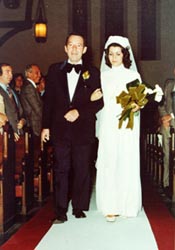
On Christmas Eve in 1968, George Hughes and his daughter Frances got out early to do some last minute shopping. When the last gift was bought and wrapped, her father, never a morning person, went back to bed for a nap.
When the phone rang, young Frances answered, imagining it was her uncle Glenn: "Hello, Uncle Glenn: daughter Number 1."
On the line was not Uncle Glenn but Spiro Agnew, then in his final months as governor of Maryland. He laughed and asked for her father. Frances said Mr. Hughes was sleeping, but she figured she could wake him up. That's how George Hughes was offered an appointment to the Maryland tax court.
The first lady of Maryland, Frances Hughes Glendening was born into politics. She grew up on the campaign trail, rubbing shoulders with politicians throughout the state and the country.
Her father, George Raymond Hughes Jr., was a lawyer from Cumberland. Elected to the House of Delegates from 1954 to 1958, he spent two years as minority leader before entering the state senate in 1962. The Republican senator again became minority leader, staying in the senate until his appointment to the tax court in 1968.
In 1970, George Hughes ran in the sixth congressional district. He lost the election, but Frances remembers being on the campaign trail throughout the state with her sisters, visiting county fairs and campaigning for their father.
"The sixth congressional district was huge, covering most of western and central Maryland. We went to so many county fairs. We always wore red, white and blue dresses so our parents could keep an eye on us. He tried to come to our events, but we also went to his."
As the oldest child, Glendening spent a lot of time with her father. She remembers him as a strong, independent man, a brilliant, caring, dedicated father, husband and public servant."
The death of her grandfather - George Raymond Hughes Sr., her father's law partner and daily companion - showed her a new man.
"I remember coming home from college the Tuesday before Thanksgiving. My grandfather had just passed away. When I walked in the door, my father gave me a huge hug. He said 'I'm so glad that you are here. I really needed you to be here and I feel better now that you're home.'
"It was the first time he opened up to me like that. It established a different type of rapport between us."
That moment stays with Frances Glendening in part because her father was not a man to share his feelings. His eldest daughter, who is one to share her feelings, has made openness a virtue in her many campaigns as a mental health advocate.
Daughter number one, of course, grew up to the life she'd learned from her father.
Ann Dorsey, 51, adoption recruiter and trainer for A.A. Co. Department of Social Services, daughter of James Gross Sr.
Different Enough - But More alike 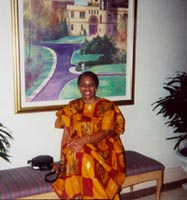
"My father has always been even tempered, calm, steady and consistent in his beliefs and everything he has done," recalls daughter Ann Dorsey. "He instilled in his children a sense of what is necessary to survive."
James Gross is a man from a different era. Born to tobacco farmers in St. Mary's County, he was raised in a poor family. Using one of the few escapes available to an African American at the time, Gross joined the Navy during World War II.
The Navy brought Gross to Annapolis, and the cooking skills he learned provided his livelihood. Gross worked at the Mandris Family Restaurant downtown. When Middleton Tavern moved into that space, Gross remained and became the head chef. Today, at the age of 75, Gross still works part time at Middleton.
"Working at Middleton Tavern was a rite of passage in my family. We all did it," Dorsey remembers. "We cooked, washed dishes or bussed tables. He set the role, and we followed his lead."
While Dorsey was growing up, her father kept the family stable; her mother took the more active role in parenting.
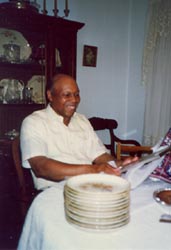 "My father was more of a silent
parent. He sometimes worked two jobs to keep the family in a good situation.
My mother was more domineering and controlling. My father was laid back.
My parents each took a role they were comfortable with."
"My father was more of a silent
parent. He sometimes worked two jobs to keep the family in a good situation.
My mother was more domineering and controlling. My father was laid back.
My parents each took a role they were comfortable with."
James was a quiet, unassuming man who didn't like to stir the waters. Dorsey Dorsey came of age in the 1960s, a time when the waters were tumbling. One of the first African Americans to integrate Annapolis High School, she entered Morgan State University during the height of the Civil Rights Movement. Her father has not always agreed with her politics or style of dress, but he has tried to understand her.
"When I was in college, my father hated my afro. He doesn't like my braids today. He's a Republican. I'm a Democrat. My father was a survivor, and he didn't try to create change. He knew who I was, respected who I was and understands why I am who I am."
Dorsey's relationship with her father has changed over time, especially over the last five years.
"For so long I was worried about my own needs, I never took the time to think or ask about what he really wants. As I have gotten older, I want to know what he wants."
Her father is no longer the quiet man of her youth.
"Dad no longer takes a back seat. He knows what he wants and says what he wants. I have an easy relationship with my dad. I talk with him and ask him for advice, but he knows I'm grown and lets me make my own decisions."
Dorsey's father has been a steadying influence on her life for over 50 years. She has come to realize her luck.
"I am fortunate to still have both my parents alive, healthy and active. My father is at the age where I want to be near him, support him and make sure he is comfortable. I want to try to give him back all that he has given to me. I try to talk with my father at least once a week. When I get the urge, I still sneak down to Middleton and ask, 'Daddy, can I have a crabcake?'"
Warren McClain III, 33, executive chef at Carrol's Creek Cafe, son of Warren McClain Jr.
Aged to Appreciation
Warren McClain Jr. was a Navy man for 27 years. His namesake son remembers his dad being gone for long stretches - sometimes six months at a time.
Growing up in a military home also meant moving around the country. The McClains lived in Florida and Virginia, spent two stints in Maryland, one in Delaware and one in Rhode Island. Moving strained the relationship between father and son, as Warren III explains:
"I resented my father because we had to move all the time because of his job. It seemed that every time I'd get established in a new area, I'd find out that we had to move again."
With a father who believed in discipline, young Warren felt that rules and responsibilities were heaped on him. As he grew older, Warren and his father butted heads. The son knew he had to follow his father's rules, but he didn't always understand why.
"In high school, when I first got my driver's license, I got into some trouble. I got a few tickets and some points on my driving record. My father was always harping on me about it. I used to hate it. Years later, I found out from my grandmother that my dad got into the same trouble when he was my age. He didn't want me to make the same mistakes he did, but I never understood that at the time."
There was never a single moment when McClain saw his father through new eyes. The change in their relationship came slowly.
"We get along better now that I have been out of the house and living on my own for awhile. Over time, I've slowly realized why he set limits and rules and the importance of discipline. Some relationships you appreciate more when you get older."
The younger McClain is the executive chef at Carrol's Creek Cafe. Over the last five years, he and his wife Shelley have started their own family. Daughter Kara and son Connor have placed him in the role of father. Time and separation have helped both McCalins understand each other better.
"I appreciate my father more now that I have children. These are difficult relationships. Things aren't as easy as you hoped they might be. There is less tension in our relationship now. It's more of a friendship. Although we don't talk about it, he knows I understand what he went through."
Melanie Miller, 31, retail manager at B.K. Miller Company, daughter of Sen. President Thomas V. Mike Miller, Jr.
From Adoration To Equality
Melanie and Melissa Miller, twin daughters of Maryland Senate President
Thomas V. Mike Miller Jr., spent their college years on the Eastern Shore
at Salisbury State. One of those was a tough year for Melanie.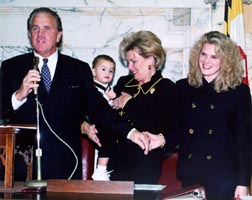
"When I was a junior or a senior I had a really bad semester," Melanie Miller recalled. "Things just weren't going well for me. At 10am on Valentine's Day, Dad showed up with a dozen roses for me and Melissa. He took us out to lunch and spent the day with us."
Miller calls her father part friend, part mentor, part role model. She grew up adoring her father, so it's taken some time for them to stand on equal footing.
"My dad is my hero. I strive to be like him," Melanie Miller said. "Nothing was given to him. He started out as a bagger at a country store; then he was the manager. I have followed his footsteps without even realizing it. My life after college really parallels his, and I think its because of the values he has instilled in me. Work hard, treat people equally, try to be more. My father always tried to be more."
Trying for more has taken the elder Miller not only to the Maryland Senate but has also made him its longest serving president. At the national level, he's chairman of the Democratic Legislative Campaign Committee and president of the State Senates' Presidents' Forum.
Miller has been in politics, on one campaign trail or another, for most of his daughter's life. But, as his daughter sees it, Miller always made family his top priority.
"Dinner was served every night at 6pm. You had to always be there," Melanie Miller explained. "Dad would work long hours, come home and go back out later. People would always say 'your dad's a politician, he must never be around.' But he always was. Work didn't take him away. He worked around the family."
Sundays were family days. When Miller made the rounds, he took the family as part of his entourage, traveling around the state, seeing new places and meeting new people.
"Dad would quiz us on the trips, asking us questions about what we had seen," Miller recalled. "When I was eight, I really didn't want to go on all these trips, but now I realize how important that contact with him was."
From childhood, the five Miller children worked to win their father votes.
"During election time, the kids would knock on doors," Miller remembers. "We say that he had five kids so each district in the precinct would be covered.
"Now we joke that he used his daughters as bait. We used to go to events with dresses on, wearing Senator Miller sashes. We were so proud of him. Now we look back, think of the costumes, laugh and ask, 'Why did you make us do that?'"
Such constant contact laid the foundation as Miller and his wife Patti instilled in their children values that still guide Melanie Miller and her brother and sisters today.
"No one in the family wants to move too far away from the rest of the family. People don't always understand why we want to stay so close. They taught me the values that get me through life. Why would you want to leave them? People say you can't be friends with your parents, but you can have both relationships with them."
A year ago, an infection after a root canal damaged a valve in Melanie's heart. She had open heart surgery to replace the bad valve.
"My father had a difficult time with my illness. It was difficult for him to walk into the hospital room. But then, and during my recovery, he was there always telling me to remember he loves me. A lot of fathers might have difficulty saying that, but he didn't."
Miller moved back home for the sixth months it took her to recover from surgery. During this time and the following year, she began to see her father in a new perspective.
"He always keeps a low profile at home. He is the last person to have a large ego. He cares about the community, wants to help people and tries to give to everybody. Now I see him in a larger perspective. For so long he was just my dad. Now I understand the role he has played in the state."
With her election as president of the Surratts Democratic Club and her appointment to the Maryland History 2000 committee, the young executive with the family business, the B.K. Miller Beverage Distribution Company, has joined her father in the political arena.
Recently, Melanie Miller turned an appearance by Kathleen Kennedy Townsend at the Surratts Democratic Club into a political fund-raiser. Expecting to sell 70 or 80 tickets, she sold 400. That event changed their father-daughter relationship. Melanie is poised to step beyond her father's shadow.
"At that event for the first time I wasn't Mike Miller's daughter. He was Melanie Miller's father."
Though she has created a life outside her family, her father is still so important to her.
"When people come over to my house they see all the pictures I have of my family. I try to have a picture of my father in every room. That way he can always look after me."
| Issue 24 |
Volume VII Number 24
June 17-23, 1999
New Bay Times
| Homepage |
| Back to Archives |